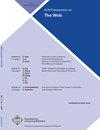Graph Attention Network for Text Classification and Detection of Mental Disorder
IF 4.1
4区 计算机科学
Q2 COMPUTER SCIENCE, INFORMATION SYSTEMS
引用次数: 1
Abstract
A serious issue in today’s society is Depression, which can have a devastating impact on a person’s ability to cope in daily life. Numerous studies have examined the use of data generated directly from users using social media to diagnose and detect Depression as a mental illness. Therefore, this paper investigates the language used in individuals’ personal expressions to identify depressive symptoms via social media. Graph Attention Networks (GATs) are used in this study as a solution to the problems associated with text classification of depression. These GATs can be constructed using masked self-attention layers. Rather than requiring expensive matrix operations such as similarity or knowledge of network architecture, this study implicitly assigns weights to each node in a neighbourhood. This is possible because nodes and words can carry properties and sentiments of their neighbours. Another aspect of the study that contributed to the expansion of the emotion lexicon was the use of hypernyms. As a result, our method performs better when applied to data from the Reddit subreddit Depression. Our experiments show that the emotion lexicon constructed by using the Graph Attention Network ROC achieves 0.91 while remaining simple and interpretable.精神障碍文本分类与检测的图注意网络
当今社会的一个严重问题是抑郁症,它会对一个人的日常生活能力产生毁灭性的影响。许多研究检查了使用社交媒体用户直接生成的数据来诊断和检测抑郁症作为一种精神疾病的情况。因此,本文研究了通过社交媒体识别抑郁症状的个人表达中使用的语言。本研究使用图形注意力网络(GATs)来解决与抑郁症文本分类相关的问题。这些GAT可以使用掩蔽的自注意层来构建。这项研究不需要昂贵的矩阵运算,如相似性或网络架构知识,而是隐式地为邻域中的每个节点分配权重。这是可能的,因为节点和单词可以携带其邻居的属性和情感。这项研究的另一个有助于扩大情感词汇的方面是使用同义词。因此,我们的方法在应用于Reddit子版块Reddit Depression的数据时表现更好。我们的实验表明,使用图注意力网络ROC构建的情感词典达到了0.91,同时保持了简单和可解释性。
本文章由计算机程序翻译,如有差异,请以英文原文为准。
求助全文
约1分钟内获得全文
求助全文
来源期刊

ACM Transactions on the Web
工程技术-计算机:软件工程
CiteScore
4.90
自引率
0.00%
发文量
26
审稿时长
7.5 months
期刊介绍:
Transactions on the Web (TWEB) is a journal publishing refereed articles reporting the results of research on Web content, applications, use, and related enabling technologies. Topics in the scope of TWEB include but are not limited to the following: Browsers and Web Interfaces; Electronic Commerce; Electronic Publishing; Hypertext and Hypermedia; Semantic Web; Web Engineering; Web Services; and Service-Oriented Computing XML.
In addition, papers addressing the intersection of the following broader technologies with the Web are also in scope: Accessibility; Business Services Education; Knowledge Management and Representation; Mobility and pervasive computing; Performance and scalability; Recommender systems; Searching, Indexing, Classification, Retrieval and Querying, Data Mining and Analysis; Security and Privacy; and User Interfaces.
Papers discussing specific Web technologies, applications, content generation and management and use are within scope. Also, papers describing novel applications of the web as well as papers on the underlying technologies are welcome.
 求助内容:
求助内容: 应助结果提醒方式:
应助结果提醒方式:


